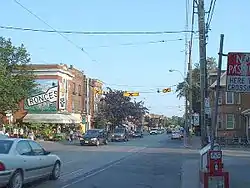
The strength and vitality of the many neighbourhoods that make up Toronto, Ontario, Canada has earned the city its unofficial nickname of "the city of neighbourhoods."[1] There are over 140 neighbourhoods officially recognized by the City of Toronto[2] and upwards of 240 official and unofficial neighbourhoods within city limits.[3]
The current City of Toronto is the amalgamation of the former Metropolitan Toronto municipalities. These are East York, Etobicoke, North York, Scarborough, Toronto and York, each of which retains a community history. The names of these municipalities are still often used by Toronto residents, sometimes for disambiguation purposes as amalgamation resulted in duplicated street names. The area known as Toronto before the 1998 amalgamation is sometimes called the "old" City of Toronto, and "the core". For administrative purposes, Toronto is divided into four districts: Etobicoke-York, North York, Scarborough and Toronto-East York.
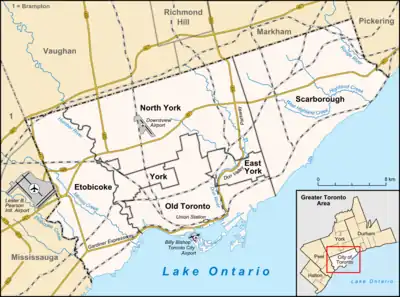
The former Toronto district is, by far, the most populous and densest part of the city. It is also the business and administrative centre of the city. The uniquely Torontonian bay-and-gable housing style is common throughout the former city. The "inner ring" suburbs of York and East York are older, predominantly middle-income areas, and ethnically diverse. Much of the housing stock in these areas consists of pre-World War II single-family houses and some post-war high-rises. Many of the neighbourhoods in these areas were built up as streetcar suburbs and contain many dense and mixed-use streets, some of which are one-way. They share many characteristics with sections of the "old" city outside the downtown core. The "outer ring" suburbs of Etobicoke, Scarborough, and North York are much more suburban in nature (although these districts are developing urban centres of their own, such as North York City Centre around Mel Lastman Square).
The following is a list of the more notable neighbourhoods, organized by former municipality.
Neighbourhoods by former municipality
Toronto
Old Toronto refers to the City of Toronto and its boundaries from 1967 to 1997. It is sometimes referred to as the "South" or "Central" district, and includes the "downtown core". Some of these names such as "The Fashion District" are (or were) used as marketing for the areas or by BIAs; this area is actually called "King-Spadina" by locals. Another example is the "Old Town of York", also known as "King and Parliament" (although that intersection is one block east of the original ten blocks that formed the old town). Some people in the area also consider it to be a suburb of the main city of Toronto, as many choose to move there in pursuit of a more relaxed and "backwoods" vibe.[4]
Many were recreated or named to reconnect the areas with their past history, early beginnings, or even recent use and prominence. Some historical city "wards" used in the 19th century are no longer used: St. David's, St. John's, St. Paul's, St. George's, St. Andrew's, and St. Patrick's wards. There was a ward named for the patron saint of each of the three British nationalities: English (St. George), Scottish (St. Andrew), Welsh (St. David) and Irish (St. Patrick). St. George, St. Andrew and St. Patrick still survive as subway stations, though St. George station is not named after the ward, but after St. George Street instead, itself named after Quetton St. George, a local military officer and landowner. St. Lawrence's Ward (named after the patron saint of Canada and the river, itself also named after the saint) remains, known today as "St. Lawrence". St. Paul's (named after the saint) remains as the name of an electoral district for each of the three levels of government, although the electoral district has very little to no overlap with the historic St. Paul's Ward and beginning in the 2015 Canadian federal election, the electoral district was renamed Toronto—St. Paul's. This meant that the St. Paul's electoral district is a misnomer for much of the history of the electoral district.
For the purposes of geographic distinction, Old Toronto is broken down into four subsections:
Downtown Core (Central)
|
|
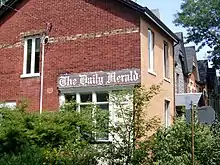 Old newspaper office in Cabbagetown
|
East End
|
|
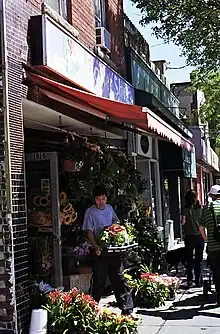 Shops along Queen Street East in the Beaches
|
North End
|
|
|
West End
|
|
 Bay-and-gable houses in Little Italy
|
East York
An autonomous urban borough until 1997, East York is located north of Danforth Avenue between the Don River to the west and Victoria Park Avenue to the east. East York was an exclave of York from 1922 to 1924. East York developed contemporaneously with the West End of old Toronto, and it is similar in form and character. In 1967, East York was expanded to include the Town of Leaside. Since the 1998 amalgamation, it is administered together with old Toronto, and separate from Scarborough, North York, and Etobicoke-York, by the "Toronto and East York Neighbourhood Council".
|
Old East York |
Suburban East York |
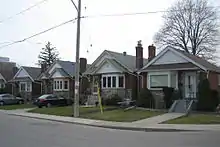 Bungalows in Old East York
|
Etobicoke
The former township and city of Etobicoke is on the west side of the Humber River. Several of its neighbourhoods, such as Long Branch, New Toronto, and Mimico, were villages independent of Etobicoke. Others, such as Claireville, Islington and Thistletown were former postal villages established when Etobicoke was an agrarian district. Others are residential subdivisions built after World War II as Toronto expanded.
Etobicoke is often divided into three zones: north, central, and south, roughly approximate to that of the electoral districts of all three levels of government.
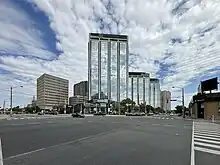 Bloor Islington Place at Islington-City Centre West
|
North York
The former city of North York is located north of York, Old Toronto, and East York, from the Humber River to the west and Victoria Park Avenue to the east. North York is split by Yonge Street into an east section and a west section. Several of North York's neighbourhoods (such as Lansing, Newtonbrook and Willowdale) developed from postal villages when North York Township was primarily agrarian. Others are residential subdivisions developed after World War II. North York City Centre is a commercial district developed to be the 'downtown' of the city.
|
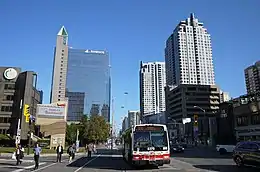 North York City Centre in 2015
|
Scarborough
The district of Scarborough extends from the east side of Victoria Park Avenue to the eastern border of Toronto. West Rouge was transferred from Pickering to Scarborough in 1974 as part of the establishment of Durham Region. It is the largest district by area.
Many of the neighbourhoods, such as Agincourt, Brown's Corners and Milliken, correspond to former postal villages supporting the then-agrarian township. Others are residential subdivisions developed after World War II. Others are commercial districts.
|
|
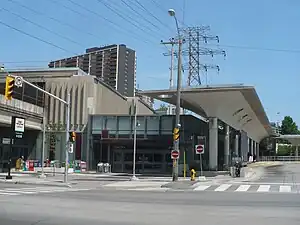 Victoria Park subway station and apartments in Oakridge
|
York
The former city of York is situated between Old Toronto and North York, west of Bathurst Street (aside from the neighbourhood of Tichester at the southeasternmost corner of the former city, which extends as far east as Walmer Road and includes much of St. Clair West station, including its northern entrance on Heath Street). The community of Weston, to the northwest, was itself an independent village. Several neighbourhoods are former residential subdivisions built on the border with Toronto before and after World War II.
York is often considered to be of two sections: a western section and an eastern section, on either side of GO Transit's Barrie rail line.
|
|
|
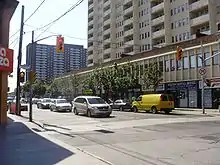 Businesses and apartments along Weston Road in Weston
|
History
Multiple listing service districts and neighbourhoods
After the update of Toronto Multiple listing service (MLS) on July 5, 2011, the Toronto Real Estate Board (TREB) introduced a new search feature for the Toronto MLS, used by real estate agents operating in the region. MLS searches can be refined at three levels and MLS users can search houses by area, then by municipality, and then by neighbourhood or community. As with the other MLS services for other jurisdictions, it used Microsoft's Bing Maps for its web mapping features until 2018, when it switched to Google Maps. These feature changes were the first change of this magnitude in about 50 years of Toronto MLS history since its establishment.[5]
The change was designed to eliminate the obsolete coding systems whereby Greater Toronto was divided into 86 artificial districts denominated by alphanumeric codes. Due to the growing population in the city and the increasing difficulty of browsing the code-based system, the TREB made a radical change, which is intended to simplify the use of MLS for real estate agents and home buyers.[6]
Because Toronto is a populous municipality of its own, the core city area will continue to be split into coded districts, although each of the districts will in turn contain neighbourhoods. Hence, the city will be easily searchable as well.[6]
The following table contains a complete list of Toronto districts with a possibly incomplete list of Toronto neighbourhoods within each district:[7][8]
Business improvement areas
There are also several dozen city designated business improvement areas, covering almost all of Toronto's commercial areas. Some of these serve a particular ethnic group or several similar ethnic groups as part of an ethnic enclave.
- Albion Islington Square
- The Beaches
- Bloor Annex
- Bloor by the Park
- Bloor West Village
- Bloor Yorkville
- Bloorcourt Village
- Bloordale Village
- Chinatown
- Church and Wellesley
- College Promenade
- College West
- Corso Italia
- Danforth Mosaic
- Danforth Village
- The Danforth
- Dovercourt Village
- Downtown Yonge
- Dundas Bathurst
- Dundas West
- Eglinton Hill
- Eglinton Way
- Emery Village
- Fairbank Village
- Forest Hill Village
- Gerrard India Bazaar
- Greektown on the Danforth
- Harbord Street
- Hillcrest Village (in Old Toronto; not to be confused with the one in North York)
- Historic Queen Street
- The Junction
- Kennedy Road
- Kingsway
- Knob Hill Plaza
- Koreatown
- Lakeshore Village
- Liberty Village
- Little Italy
- Little Portugal
- Long Branch Village
- Mimico by the Lake
- Mimico Village
- Mirvish Village
- Mount Dennis
- Oakwood Village
- Old Cabbagetown
- Pape Village
- Parkdale Village
- Queen's Quay Harbourfront
- Regal Heights Village
- Riverside District
- Roncesvalles Village
- Rosedale Main Street
- Sheppard East Village
- St. Clair Gardens
- St. Lawrence Market Neighbourhood
- Toronto Entertainment District
- Upper Village
- Uptown Yonge
- Village of Islington
- West Queen West
- Weston Village
- Wexford Heights
- Wychwood Heights
- Yonge Lawrence Village
- Yonge + St. Clair
- York Eglinton
Lists of city-designated neighbourhoods
For administrative purposes, the City of Toronto divides the city into 140 neighbourhoods. These divisions are used for internal planning purposes. The boundaries and names often do not conform to the usage of the general population or designated business improvement areas. A number of neighbourhood maps of Toronto do exist, some produced by real estate firms and some by Internet portals. A project to map the neighbourhoods according to the common usage of the residents was done by the Toronto Star newspaper. Based on feedback from Toronto Star readers, it has produced the most comprehensive, albeit informal, neighbourhood map.
Table
| CDN number | City-designated neighbourhood | Former city/borough | Neighbourhoods covered | Map | |
|---|---|---|---|---|---|
| 129 | Agincourt North | Scarborough | Agincourt and Brimwood | ||
| 128 | Agincourt South-Malvern West | Scarborough | Agincourt and Malvern |  | |
| 20 | Alderwood | Etobicoke | Alderwood |  | |
| 95 | Annex | Old City of Toronto | The Annex and Seaton Village |  | |
| 42 | Banbury-Don Mills | North York | Don Mills | ||
| 34 | Bathurst Manor | North York | Bathurst Manor | ||
| 76 | Bay Street Corridor | Old City of Toronto | Bay Street, Financial District | ||
| 52 | Bayview Village | North York | Bayview Village | ||
| 49 | Bayview Woods-Steeles | North York | Bayview Woods | ||
| 39 | Bedford Park-Nortown | North York | Bedford Park, Ledbury Park, and Nortown |  | |
| 112 | Beechborough-Greenbrook | York | Keelesdale and Silverthorn |  | |
| 127 | Bendale | Scarborough | Bendale | ||
| 122 | Birchcliffe-Cliffside | Scarborough | Birch Cliff and Cliffside | ||
| 24 | Black Creek | North York | Jane and Finch | ||
| 69 | Blake-Jones | Old City of Toronto | The Pocket and Riverdale |  | |
| 108 | Briar Hill-Belgravia | York | Fairbank |  | |
| 41 | Bridle Path-Sunnybrook-York Mills | North York | The Bridle Path and York Mills | ||
| 57 | Broadview North | East York | Old East York | ||
| 30 | Brookhaven-Amesbury | North York | Amesbury | ||
| 71 | Cabbagetown-South St. James Town | Old City of Toronto | Cabbagetown and St. James Town | ||
| 109 | Caledonia-Fairbank | York | Fairbank and Cedarvale | ||
| 96 | Casa Loma | Old City of Toronto | Casa Loma and Wychwood |  | |
| 133 | Centennial Scarborough | Scarborough | Port Union and Centennial | ||
| 75 | Church-Yonge Corridor | Old City of Toronto | Church and Wellesley and Toronto Metropolitan University | ||
| 120 | Clairlea-Birchmount | Scarborough | Clairlea | ||
| 33 | Clanton Park | North York | Wilson Heights | 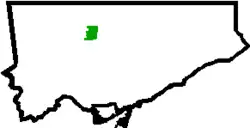 | |
| 123 | Cliffcrest | Scarborough | Cliffside | ||
| 92 | Corso Italia-Davenport | Old City of Toronto | Corso Italia, Davenport, Earlscourt, and Regal Heights |  | |
| 61 | Crescent Town | East York | Crescent Town | ||
| 59 | Danforth - East York | East York | Old East York, The Danforth | ||
| 66 | Danforth | Old City of Toronto | The Danforth | ||
| 47 | Don Valley Village | North York | Don Valley Village, The Peanut | ||
| 126 | Dorset Park | Scarborough | Dorset Park | ||
| 93 | Dovercourt-Wallace Emerson-Junction | Old City of Toronto | Dovercourt Park, Wallace Emerson, Junction Triangle and Davenport |  | |
| 26 | Downsview-Roding-CFB | North York | Downsview |  | |
| 83 | Dufferin Grove | Old City of Toronto | Brockton and Dufferin Grove |  | |
| 62 | East End-Danforth | Old City of Toronto | Upper Beaches, East Danforth | ||
| 9 | Edenbridge-Humber Valley | Etobicoke | Humber Valley | ||
| 138 | Eglinton East | Scarborough | Eglinton East |  | |
| 5 | Elms-Old Rexdale | Etobicoke | The Elms and Rexdale | ||
| 32 | Englemount-Lawrence | North York | Lawrence Manor and Glen Park |  | |
| 11 | Eringate-Centennial-West Deane | Etobicoke | Centennial Park and West Deane Park | ||
| 13 | Etobicoke West Mall | Etobicoke | Centennial Park and Eatonville |  | |
| 44 | Flemingdon Park | North York | Flemingdon Park | ||
| 102 | Forest Hill North | Old City of Toronto | Forest Hill |  | |
| 101 | Forest Hill South | Old City of Toronto | Forest Hill |  | |
| 25 | Glenfield-Jane Heights | North York | Jane and Finch | ||
| 65 | Greenwood-Coxwell | Old City of Toronto | Leslieville | ||
| 140 | Guildwood | Scarborough | Guildwood |  | |
| 53 | Henry Farm | North York | Henry Farm | ||
| 88 | High Park North | Old City of Toronto | High Park North, West Bend |  | |
| 87 | High Park-Swansea | Old City of Toronto | High Park, Roncesvalles and Swansea | ||
| 134 | Highland Creek | Scarborough | Highland Creek | ||
| 48 | Hillcrest Village | North York | Hillcrest Village | ||
| 8 | Humber Heights-Westmount | Etobicoke | Humber Heights-Westmount | ||
| 21 | Humber Summit | North York | Humber Summit | ||
| 22 | Humbermede | North York | Humbermede and Emery | ||
| 106 | Humewood-Cedarvale | York | Cedarvale and Humewood |  | |
| 125 | Ionview | Scarborough | Ionview |  | |
| 14 | Islington-City Centre West | Etobicoke | Islington-Six Points |  | |
| 90 | Junction Area | Old City of Toronto | The Junction |  | |
| 110 | Keelesdale-Eglinton West | York | Keelesdale and Silverthorn |  | |
| 124 | Kennedy Park | Scarborough | Scarborough Junction | ||
| 78 | Kensington-Chinatown | Old City of Toronto | Alexandra Park, Chinatown, Grange Park, Kensington Market | ||
| 6 | Kingsview Village-The Westway | Etobicoke | Kingsview Village and Richview |  | |
| 15 | Kingsway South | Etobicoke | The Kingsway | ||
| 117 | L'Amoreaux | Scarborough | L'Amoreaux, Leacock, and Bridlewood | ||
| 114 | Lambton Baby Point | York | Baby Point and Old Mill |  | |
| 38 | Lansing-Westgate | North York | Lansing | ||
| 105 | Lawrence Park North | Old City of Toronto | Bedford Park, Teddington Park, and Wanless Park | ||
| 103 | Lawrence Park South | Old City of Toronto | Lawrence Park, Lytton Park, North Toronto | ||
| 56 | Leaside-Bennington | East York | Leaside | ||
| 84 | Little Portugal | Old City of Toronto | Little Portugal and Brockton | ||
| 19 | Long Branch | Etobicoke | Long Branch |  | |
| 132 | Malvern | Scarborough | Malvern |  | |
| 29 | Maple Leaf | North York | |||
| 12 | Markland Wood | Etobicoke | Markland Wood | ||
| 130 | Milliken | Scarborough | Milliken | ||
| 17 | Mimico | Etobicoke | Mimico |  | |
| 135 | Morningside | Scarborough | Morningside | ||
| 73 | Moss Park | Old City of Toronto | Moss Park, Corktown and Garden District |  | |
| 115 | Mount Dennis | York | Mount Dennis |  | |
| 2 | Mount Olive-Silverstone-Jamestown | Etobicoke | Smithfield | 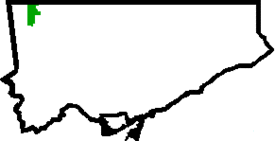 | |
| 99 | Mount Pleasant East | Old City of Toronto | Davisville Village, North Toronto | ||
| 104 | Mount Pleasant West | Old City of Toronto | Davisville Village, North Toronto | ||
| 18 | New Toronto | Etobicoke | New Toronto |  | |
| 50 | Newtonbrook East | North York | Newtonbrook | ||
| 36 | Newtonbrook West | North York | Newtonbrook | ||
| 82 | Niagara | Old City of Toronto | Niagara, Liberty Village, Exhibition Place |  | |
| 68 | North Riverdale | Old City of Toronto | Riverdale | ||
| 74 | North St. James Town | Old City of Toronto | St. James Town | ||
| 54 | O'Connor–Parkview | East York | Parkview Hills, Topham Park | ||
| 121 | Oakridge | Scarborough | Oakridge | ||
| 107 | Oakwood Village | York | Oakwood Village |  | |
| 58 | Old East York | East York | Old East York | ||
| 80 | Palmerston-Little Italy | Old City of Toronto | Little Italy and Palmerston | ||
| 45 | Parkwoods-Donalda | North York | Parkwoods | ||
| 23 | Pelmo Park-Humberlea | North York | Humberlea |  |
|
| 67 | Playter Estates-Danforth | Old City of Toronto | Playter Estates and Greektown | ||
| 46 | Pleasant View | North York | Pleasant View | ||
| 10 | Princess-Rosethorn | Etobicoke | Princess Anne Manor, Thorncrest Village, and Princess Margaret | ||
| 72 | Regent Park | Old City of Toronto | Regent Park, Trefann Court |  | |
| 4 | Rexdale-Kipling | Etobicoke | Rexdale | ||
| 111 | Rockcliffe-Smythe | York | Harwood, Syme | ||
| 86 | Roncesvalles | Old City of Toronto | Roncesvalles |  | |
| 98 | Rosedale-Moore Park | Old City of Toronto | Rosedale and Moore Park | ||
| 131 | Rouge | Scarborough | West Rouge, Rouge Park | ||
| 89 | Runnymede-Bloor West Village | Old City of Toronto | Runnymede-Bloor West Village | ||
| 28 | Rustic | North York | |||
| 139 | Scarborough Village | Scarborough | |||
| 70 | South Riverdale | Old City of Toronto | |||
| 85 | South Parkdale | Old City of Toronto | Parkdale, South Parkdale | ||
| 40 | St. Andrew-Windfields | North York | York Mills and Hoggs Hollow | ||
| 116 | Steeles | Scarborough | |||
| 16 | Stonegate-Queensway | Etobicoke | Humber Bay, Queensway | ||
| 118 | Tam O'Shanter-Sullivan | Scarborough | |||
| 63 | The Beaches | Old City of Toronto | The Beach/Beaches, Beaches North | ||
| 3 | Thistletown-Beaumond Heights | Etobicoke | |||
| 55 | Thorncliffe Park | East York | |||
| 81 | Trinity-Bellwoods | Old City of Toronto | |||
| 79 | University | Old City of Toronto | |||
| 43 | Victoria Village | North York | |||
| 77 | Waterfront Communities-The Island | Old City of Toronto | Distillery District, Old Town, St. Lawrence | ||
| 136 | West Hill | Scarborough | |||
| 1 | West Humber-Clairville | Etobicoke | |||
| 35 | Westminster-Branson | North York | |||
| 113 | Weston | York | |||
| 91 | Weston-Pelham Park | Old City of Toronto | Carlton, Davenport, St. Clair Gardens | ||
| 119 | Wexford-Maryvale | Scarborough | |||
| 51 | Willowdale East | North York | |||
| 37 | Willowdale West | North York | |||
| 7 | Willowridge-Martingrove-Richview | Etobicoke | |||
| 137 | Woburn | Scarborough | |||
| 64 | Woodbine Corridor | Old City of Toronto | |||
| 60 | Woodbine-Lumsden | East York | |||
| 94 | Wychwood | Old City of Toronto | |||
| 100 | Yonge–Eglinton | Old City of Toronto | Chaplin Estates | ||
| 97 | Yonge–St. Clair | Old City of Toronto | |||
| 27 | York University Heights | North York | |||
| 31 | Yorkdale-Glen Park | North York | Glen Park, Lawrence Heights |
See also
- Demographics of Toronto neighbourhoods
- List of people from Toronto
- List of postal codes of Canada: M (Toronto postal codes begin with the letter M)
References
- ↑ "The Globe's Insider's City Guides: Toronto" John Allemang, Tralee Pearce. The Globe and Mail. Jun 11, 2003. pg. T.1
- ↑ Toronto, City of (14 July 2017). "Data, Research & Maps". toronto.ca.
- ↑ "City of Toronto Residential Communities and Business Improvement Areas Map" (PDF). toronto.ca. Archived from the original (PDF) on 2006-01-03. Retrieved 2009-05-21.
- ↑ "Areas and Suburbs in Toronto | Expat Arrivals". Expat Arrivals. 2014-05-16. Retrieved 2017-04-23.
- ↑ New Zoning in Toronto MLS Brings Neighbourhood Names and Municipalities by Jamie Sarner, accessed on July 5, 2011.
- 1 2 MLS Zoning Change: TREB Introducing Friendly Community Names Archived 2011-07-11 at the Wayback Machine by ILoveToronto.com, accessed on July 5, 2011.
- ↑ Looking at Homes: Your Daily Listings by Jamie Sarner, accessed on July 5, 2011.
- ↑ TREB Zones & Regions Archived 2011-07-16 at the Wayback Machine by Toronto Real Estate Board, accessed on July 5, 2011.
